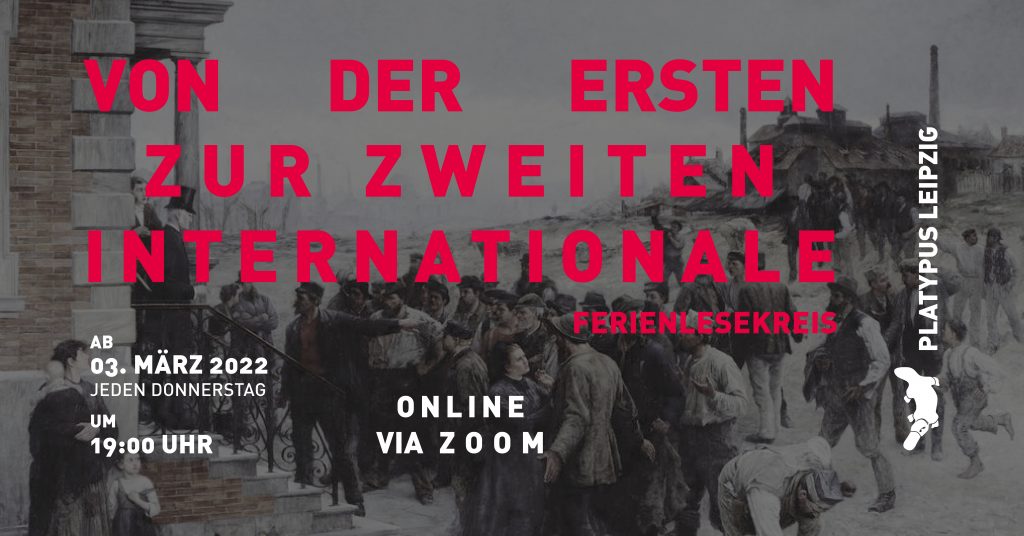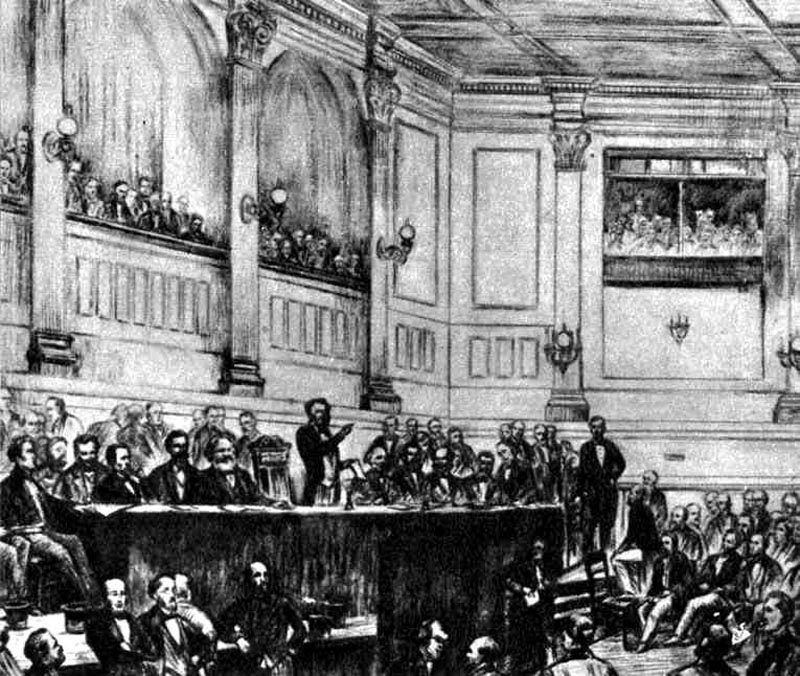Zum historischen Verhältnis zwischen Anarchismus und Marxismus

Zeit: 03.03. - 07.04.2022 (6 Termine), immer donnerstags 19:00-22:00 Uhr
Ort: https://us02web.zoom.us/j/82748045479
Die Texte werden im Voraus gelesen und dann zusammen diskutiert. Neueinsteiger/innen sind herzlich Willkommen. Vorkenntnisse werden keine benötigt.
• vorausgesetzte Texte
+ zusätzlich empfohlene Texte
Empfohlene Vorbereitungs- und Hintergrundliteratur:
+ Chris Cutrone, "On anarchism and Marxism" (2008)
+ Trevor Bark, "Half-time team talk" (response to Cutrone) (2008)
+ Chris Cutrone, "Against dogmatic abstraction" (2010)
+ Edmund Wilson, Der Weg nach Petersburg (1940), Part II. Kapitel 12–16 (von "Marx und Engels wenden sich der Geschichtsschreibung zu” bis "Karl Marx stirbt an seinem Schreibtisch") (1924)
+ James Joll, The Second International 1889-1914 (1966)
1. Woche | 03.03.22
• Pierre-Joseph Proudhon, Was ist das Eigentum?, vor allem Kapitel 1, 3 und 4 (1840)
• Karl Marx’ Brief “über P. J. Proudhon” an J. B. v. Schweitzer (1865)
2. Woche | 10.03.22
+ Karl Korsch, "Der Marxismus der Ersten Internationale“ (1924)
• Marx, Inauguraladresse der Internationalen Arbeiter-Assoziation (1864)
• Ferdinand Lassalle, ''Offenes Antwortschreiben'' (1863)
• Michael Bakunin, "A Critique of the German Social-Democratic Program" (1870)
• Bakunin, Marxism, Freedom and State (1872)
3. Woche | 17.03.22
• Marx, Kritik des Gothaer Programms (1875)
• Marx, "Einleitung zum Programm der französischen Arbeiterpartei" (1880)
• Karl Kautsky, Das Erfurter Programm (1892)
+ Korsch, Einleitung zu Marx, Randglossen zum Programm der deutschen Arbeiterpartei (1922)
4. Woche | 24.03.22
• Kautsky, Die soziale Revolution (1902), Teil 1 [in GER (Fraktur) oder ENG] und Teil 2
5. Woche | 31.03.22
• Peter Kropotkin, Die Eroberung des Brotes, vor allem Kapitel 3, 11 und 12 (1906)
• Kropotkin, Anarchist Communism (1909)
+ Errico Malatesta Syndicalism and Anarchism (1926)
6. Woche | 07.04.22
• Kautsky, Der Weg zur Macht (1909)
Zum historischen Verhältnis zwischen Anarchismus und Marxismus

Zeit: 28.02.-04.04.2022 (6 Termine), immer montags 19:30-22:30 Uhr
Ort: https://us06web.zoom.us/j/87816906025
• vorausgesetzte Texte
+ zusätzlich, empfohlene Texte
Die Texte werden im Voraus gelesen und dann zusammen diskutiert. Neueinsteiger/innen sind herzlich Willkommen. Vorkenntnisse werden keine benötigt.
Empfohlene Vorbereitungs- und Hintergrundliteratur:
+ Chris Cutrone, "On anarchism and Marxism" (2008)
+ Trevor Bark, "Half-time team talk" (response to Cutrone) (2008)
+ Chris Cutrone, "Against dogmatic abstraction" (2010)
+ Edmund Wilson, Der Weg nach Petersburg (1940), Part II. Kapitel 12–16 (von "Marx und Engels wenden sich der Geschichtsschreibung zu” bis "Karl Marx stirbt an seinem Schreibtisch") (1924)
+ James Joll, The Second International 1889-1914 (1966)
1.Woche | 28.02.
• Pierre-Joseph Proudhon, Was ist das Eigentum?, vor allem Kapitel 1, 3 und 4 (1840)
• Karl Marx’ Brief “über P. J. Proudhon” an J. B. v. Schweitzer (1865)
2. Woche | 07.03.
+ Karl Korsch, "Der Marxismus der Ersten Internationale“ (1924)
• Marx, Inauguraladresse der Internationalen Arbeiter-Assoziation (1864)
• Ferdinand Lassalle, ''Offenes Antwortschreiben'' (1863)
• Michael Bakunin, "A Critique of the German Social-Democratic Program" (1870)
• Bakunin, Marxism, Freedom and State (1872)
3. Woche | 14.03.
• Marx, Kritik des Gothaer Programms (1875)
• Marx, "Einleitung zum Programm der französischen Arbeiterpartei" (1880)
• Karl Kautsky, Das Erfurter Programm (1892)
+ Korsch, Einleitung zu Marx, Randglossen zum Programm der deutschen Arbeiterpartei (1922)
4. Woche | 21.03.
• Kautsky, Die soziale Revolution (1902), Teil 1 [in GER (Fraktur) oder ENG] und Teil 2
5. Woche | 28.03.
• Peter Kropotkin, Die Eroberung des Brotes, vor allem Kapitel 3, 11 und 12 (1906)
• Kropotkin, Anarchist Communism (1909)
+ Errico Malatesta Syndicalism and Anarchism (1926)
6. Woche | 04.04.
• Kautsky, Der Weg zur Macht (1909)
Der Ferienlesekreis beschäftigt sich mit der ersten Internationale und dem Verhältnis zwischen Anarchismus und Marxismus - u.a. bei Bakunin und Kropotkin.
A panel held at the Sixth Annual Platypus International Convention on Saturday, April 5, 2014 at the School of the Art Institute of Chicago.
Panelists:
Dimitrios Roussopoulos (Transnational Institute of Social Ecology)
Tarek Shalaby (Revolutionary Socialists (Egypt))
Joshua Stephens (Institute for Anarchist Studies)
Description:
It seems that there are still only two radical ideologies: Anarchism and Marxism. They emerged out of the same crucible - the Industrial Revolution, the unsuccessful revolutions of 1848 and 1871, a weak liberalism, the centralization of state power, the rise of the workers movement, and the promise of socialism. They are the revolutionary heritage, and all significant radical upsurges of the last 150 years have returned to mine their meaning for the current situation. In this respect, our moment seems no different.
There are a few different ways these ideologies have been taken up. Recent worldwide square occupations reflect one pattern: a version of Marxist theory — understood as a political-economic critique of capitalism — is used to comprehend the world, while an anarchist practice — understood as an anti-hierarchical principle that insists revolution must begin now — is used to organize, in order to change it. Some resist this combination, claiming that Marxism rejects anti-statist adventurism, and call for a strategic reorganization of the working class to resist austerity, and perhaps push forward a “New New Deal”. This view remains wedded to a supposedly practical welfarist social democracy, which strengthens the state and manages capital. There is a good deal of hand waving in both these orientations with regard to politics, tactics, and the end goal. Finally, there have been attempts to leave the grounds of these theories entirely — but these often seem either to land right back in one of the camps or to remain marginal.
To act today we seek to draw up the balance sheet of the 20th century. The historical experience concentrated in these ideas must be unfurled if they are to serve as compass points. To see in what ways the return of these ideologies represent an authentic engagement and in what ways the return of a ghost. Where have the battles left us? What forms do we have for meeting, theoretically and practically, the problems of our present?
Questions:
1. What do Marxism and Anarchism have to say to those politicized today? Do they instruct us as to how we might act, now? Must we return to these orientations? If so, how?
2. Many recent leftist groupings tend toward square occupation and leaderless horizontality, while retaining an unclear, even reformist, ideological orientation toward capitalism and the state. How do you understand the advent of these forms? Do they challenge traditional Marxist theory and ways of organizing? Are they affirmations of Anarchist modes of thinking and practice? In general, what forms of organization are necessitated by the theories we inherit and the tasks of today?
3. Can you briefly assess the most important splits and breaks between and within both traditions? Does the historical divide between Marxism and Anarchism still matter? What are the significant splits within Marxism and within Anarchism that continue to shape the context?
4. What are the inalienable values and the end goals of radical politics? Are Marxism and Anarchism ideologies of freedom? Of democracy? Of the working class? How do they handle the objective contradictions of realizing these principles under the conditions of capitalist life?
5. What should we fight for today - more state or less state?
6. Has history vindicated Marxism or Anarchism or neither at all?
A panel discussion held at University of King's College on 1 February, 2014.
Sponsored by the King's Student Union and Dalhousie Student Union
Panelists:
Eva Curry - Stand
Christoph Lichtenberg - International Bolshevik Tendency
Chris Parsons - student activist
Alex Khasnabish - The Radical Imagination Project, Mount Saint Vincent University
Description:
It seems that there are still only two radical ideologies: Anarchism and Marxism. They emerged out of the same crucible - the Industrial Revolution, the unsuccessful revolutions of 1848 and 1871, a weak liberalism, the centralization of state power, the rise of the workers movement, and the promise of socialism. They are the revolutionary heritage, and all significant radical upsurges of the last 150 years have returned to mine their meaning for the current situation. In this respect, our moment seems no different.
There are a few different ways these ideologies have been taken up. Recent worldwide square occupations reflect one pattern: a version of Marxist theory — understood as a political-economic critique of capitalism — is used to comprehend the world, while ananarchist practice — understood as an anti-hierarchical principle that insists revolution must begin now — is used to organize, in order to change it. Some resist this combination, claiming that Marxism rejects anti-statist adventurism, and call for a strategic reorganization of the working class to resist austerity, and perhaps push forward a “New New Deal”. This view remains wedded to a supposedly practical welfarist social democracy, which strengthens the state and manages capital. There is a good deal of hand waving in both these orientations with regard to politics, tactics, and the end goal. Finally, there have been attempts to leave the grounds of these theories entirely — but these often seem either to land right back in one of the camps or to remain marginal.
To act today we seek to draw up the balance sheet of the 20th century. The historical experience concentrated in these ideas must be unfurled if they are to serve as compass points. To see in what ways the return of these ideologies represent an authentic engagement and in what ways the return of a ghost. Where have the battles left us? What forms do we have for meeting, theoretically and practically, the problems of our present?

